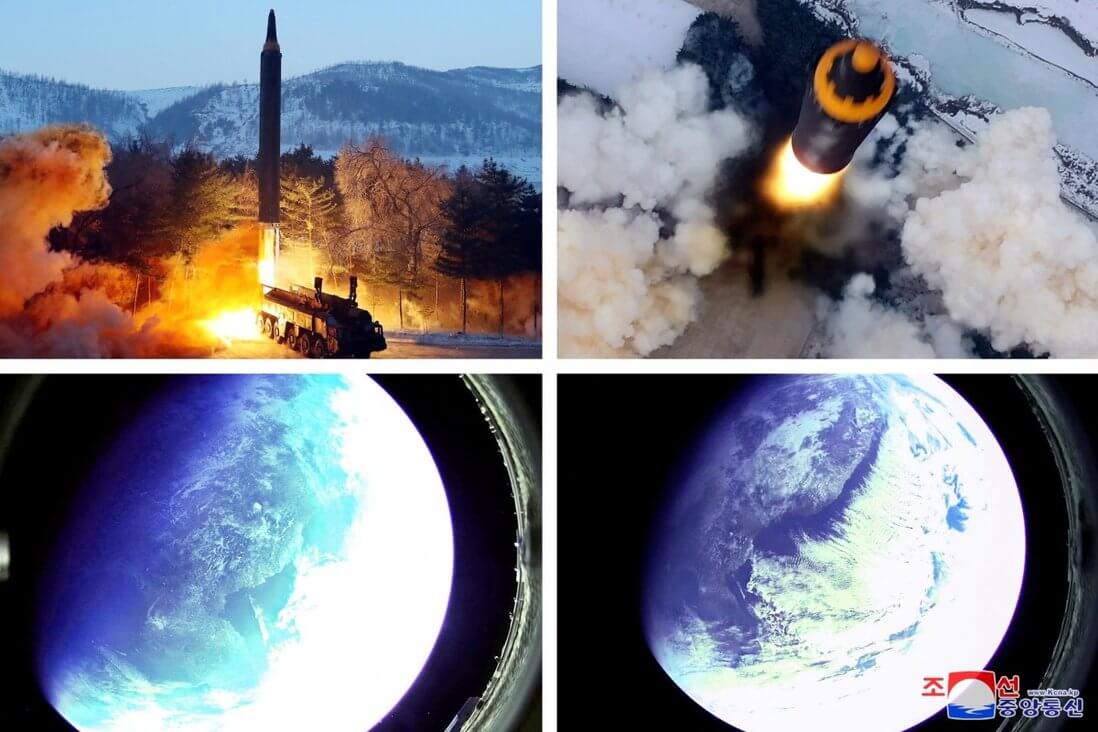North Korea confirmed on Monday that it has successfully tested the “ accuracy, security, and effectiveness ” of a Hwasong-12 intermediate-range ballistic missile (IRBM) on Sunday. This was the country’s largest missile test since 2017.
The launch was first detected by Japan and South Korea at about 7:52 am from North Korea’s Jagang Province. The single ballistic missile appeared to have landed in the ocean off its east coast.
Analysts reported that the test appeared to involve an intermediate-range ballistic missile (IRBM), which Pyongyang has not tested since 2017 when it had suspended testing its largest missiles and its nuclear weapons. Immediately following the news, the South Korean government convened a rare emergency meeting presided over by President Moon Jae-in.
“The test-fire was aimed to selectively evaluate the missile being produced and deployed and to verify the overall accuracy of the weapon system. It was conducted by the highest-angle launch system from the northwestern part of the country toward the waters of the East Sea of Korea in consideration of the security of neighbouring countries,” the state-owned Korean Central News Agency (KCNA) said. North Korea has previously said the Hwasong-12 was capable of carrying a “large-size heavy nuclear warhead.”
KCTV aired a slideshow of North Korea's Jan. 30 IRBM test as the only entry for its 5pm news segment with two new photos allegedly "photographed from outer space with a camera at the warhead of the missile."
— NK NEWS (@nknewsorg) January 31, 2022
Read more about the Hwasong-12 test here:https://t.co/dbapBgPkwr pic.twitter.com/xGsYYKgcST
In addition, North Korea’s Academy of Defence Science publicly posted pictures taken from space by a camera installed at the missile warhead, which showed North Korea and its surrounding areas through a round camera lens.
The country’s Supreme Leader Kim Jong Un did not seem to have attended the test, which was at least Pyongyang’s seventh this month. The several tests come after Kim had pledged in his New Year’s speech that his country would continue to strengthen its defence capabilities due to an increasingly uncertain military environment on the Korean peninsula.
On being asked whether the United States (US) was concerned about Pyongyang’s series of tests, a senior official of the Biden administration told journalists on Sunday: “Of course we’re concerned. It’s not just what they did yesterday, it’s the fact that this is coming on the heels of quite a significant number of tests in this month. And that follows on tests at the end of the year going back to September, of a variety of systems.”
“We obviously don’t want to see further testing and we’ve called upon to DPRK to refrain from further tests,” he continued, referring to North Korea by the initials of its official name, the Democratic People’s Republic of Korea.
In response to the series of tests, the US Treasury Department announced on January 12 that it was imposing penalties on five North Korean officials over their roles in obtaining equipment and technology for the country’s missile programs and for their broader support of North Korea’s mass destruction activities.

